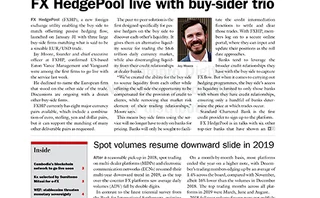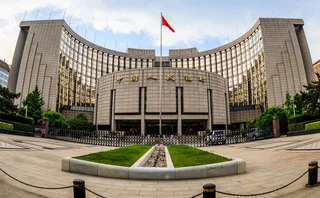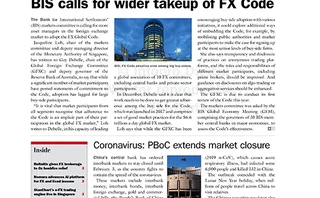
Corporates more concerned about currency moves
Firms are increasing their hedging and trying out different products

Corporate treasurers are growing more concerned about foreign exchange moves, according to a survey of risk management practices, which shows almost half of those polled increased their FX hedging and about a third revised their hedging strategy.
Wells Fargo's 2016 Risk Management Practices Survey found volatility in the FX market is driving companies to hedge more and for longer tenures, and to use different products than they have in the past.
Overall, 55% of the 250-plus corporate executives who participated in this year's survey indicated FX has become a greater concern to them. Furthermore, 47% have increased the amount of their hedged exposures, while 29% have either developed or revised their FX risk management policies.
In the two years since the last survey, the dollar rose by approximately 25%. This has heightened concern around currency moves for many companies, some of whom have started to revise their FX risk management policies to gain a fuller picture of the impact.
"It's an interesting theme we're seeing in the FX market and the survey bares that out," says David Gopal, head of Wells Fargo's FX risk management group. "Over the last two years we have seen a lot of volatility in FX markets and the definite trend in the strength of the dollar. Many US-based clients have experienced a somewhat negative impact from this move. They are seeing currency volatility and ultimately seeing negative results in their financial statements due to FX."
If you are not quantifying risk in some form or fashion, it is hard to determine how important a hedging policy might be, how you should implement that policy and what the policy should look like
David Gopal, Wells Fargo
The survey also found 18% of these C-suite executives have extended their hedge horizons, while 13% have changed their mix of hedging instruments. And 40% of respondents cited a maximum hedge horizon for forecast exposures of 12 months, but 42% hedge to longer maturities, according to the survey.
Still, corporations continue to struggle with managing FX risks in a manner that is consistent with a best practice approach. Some 36% of companies indicated to researchers they do not have a formal policy for addressing FX risk.
Only 17% of corporates stated they measure potential FX risk, signalling a lack of oversight and control since this is not being quantified and reported to senior management.
A further clue that corporations are underprepared lies in the fact that 53% of those surveyed said the biggest obstacle to establishing FX risk management best practices was deciding when to hedge and choosing the right strategy.
"We are a strong advocate that all companies should have risk management policies and we found a third of companies actually don't have formal FX policies," says Gopal. "That can be a gap in the corporate world and something that should be reconciled."
"If you are not quantifying risk in some form or fashion, it is hard to determine how important a hedging policy might be, how you should actually implement that policy and what the policy should look like," he continues.
"If you're a public or private company, it is easy to qualitatively say you operate internationally [and] are making sales in multiple currencies so you have FX risk. But if you are not qualifying the impact to your financials, you are not going to have a great sense of if FX markets move by 25%, how it can impact earnings translation, and that ultimately hurts share price," Gopal adds.
Only users who have a paid subscription or are part of a corporate subscription are able to print or copy content.
To access these options, along with all other subscription benefits, please contact customer services - www.fx-markets.com/static/contact-us, or view our subscription options here: https://subscriptions.fx-markets.com/subscribe
You are currently unable to print this content. Please contact customer services - www.fx-markets.com/static/contact-us to find out more.
You are currently unable to copy this content. Please contact info@fx-markets.com to find out more.
Copyright Infopro Digital Limited. All rights reserved.
As outlined in our terms and conditions, https://www.infopro-digital.com/terms-and-conditions/subscriptions/ (point 2.4), printing is limited to a single copy.
If you would like to purchase additional rights please email info@fx-markets.com
Copyright Infopro Digital Limited. All rights reserved.
You may share this content using our article tools. As outlined in our terms and conditions, https://www.infopro-digital.com/terms-and-conditions/subscriptions/ (clause 2.4), an Authorised User may only make one copy of the materials for their own personal use. You must also comply with the restrictions in clause 2.5.
If you would like to purchase additional rights please email info@fx-markets.com
More on Foreign Exchange
Average reported daily UK FX turnover hits record high
Daily turnover of $2,881bn in October 2019, up 2% from previous high of $2,821bn in April
PBoC injects 1.2 trillion yuan as markets plunge
Chinese central bank eases to support economy as coronavirus spreads; Q1 GDP growth could drop to 4%
Spot volumes on platforms resumed downward trend in 2019
But an uptick was seen in FX swaps and forwards submitted for settlement
PBoC extends market closure as coronavirus spreads rapidly
Chinese central bank extends interbank markets closure and vows to maintain ample liquidity








